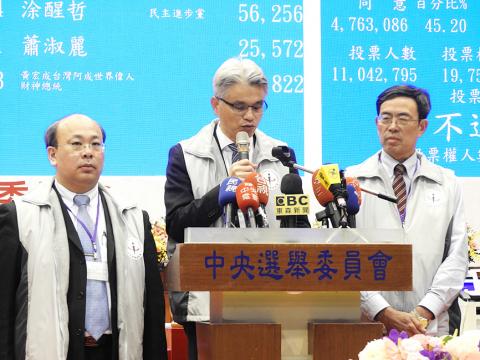Former Central Election Commission (CEC) chairman Chen In-chin (陳英鈐) yesterday apologized to voters and resigned over criticisms surrounding long delays at polling booths for the nine-in-one elections on Saturday.
“As the senior official, I must accept all responsibility and as I have said before, I will engage in sincere introspection,” Chen said before announcing his resignation.
Executive Yuan spokeswoman Kolas Yotaka confirmed that Chen’s resignation has been accepted.

Photo: Chen Yu-fu, Taipei Times
With people still lined up as polling stations were scheduled to close, the commission allowed voting to continue, with some stations remaining open while others were counting ballots.
Polling stations become ballot-counting stations immediately upon the completion of voting, according to Article 57 of the Civil Servants Election and Recall Act (公職人員選舉罷免法).
Chen consulted 15,000 polling stations nationwide before Saturday to ask about the possibility of adding more screens to accommodate more voters, but only 3,500 of the stations were large enough for additional screens, he said.
Polling station locations were already determined when additional referendums were added and it was too late to change them, he said.
The commission asked people to be sure that they understood the referendums before entering voting booths to speed things up, he said.
“It really was too long to make people wait, but overall, the process remained quite orderly,” he said.
Chen rejected reports that ballots were being counted at polling stations that were still open.
However, those who were in line before 4pm were permitted to vote, which was in accordance with the law, he said.
Asked why the commission did not wait until all polling stations closed before starting to count ballots, Chen said the law stipulates that the changeover must be done at each station immediately following the completion of voting.
There have also been incidents in previous elections of polling stations starting their counts at different times, he said, adding that he welcomed input on whether voting would be affected by this.
Taipei’s 1,563 polling stations had all finished with voting by 7:46pm — just after Taoyuan, which finished at 7:29pm.
Taipei’s Nangang District (南港) polling station finished counting votes at about 11pm — the first of the city’s 1,563 stations to do so — and by 2:35am yesterday all stations in Taipei were finished, 10 hours, 35 minutes from when polls opened.
The last polling station nationwide to finish counting was Dayun Bisian Temple (大雲碧仙寺) in Taoyuan’s Jhongli District (中壢), which finished at 2:39am.
“This is the first time the process has taken this long,” said a polling station worker in Taipei, who spoke on condition of anonymity.
Lin Mei-lun (林美倫), director of a Taipei elections supervisory task force, said she would raise concerns with the commission over the poor execution of this year’s elections.
The referendums must be separated from the mayoral and commissioner elections, or an electronic system adopted for referendum voting, Lin said.

DAREDEVIL: Honnold said it had always been a dream of his to climb Taipei 101, while a Netflix producer said the skyscraper was ‘a real icon of this country’ US climber Alex Honnold yesterday took on Taiwan’s tallest building, becoming the first person to scale Taipei 101 without a rope, harness or safety net. Hundreds of spectators gathered at the base of the 101-story skyscraper to watch Honnold, 40, embark on his daredevil feat, which was also broadcast live on Netflix. Dressed in a red T-shirt and yellow custom-made climbing shoes, Honnold swiftly moved up the southeast face of the glass and steel building. At one point, he stepped onto a platform midway up to wave down at fans and onlookers who were taking photos. People watching from inside

A Vietnamese migrant worker yesterday won NT$12 million (US$379,627) on a Lunar New Year scratch card in Kaohsiung as part of Taiwan Lottery Co’s (台灣彩券) “NT$12 Million Grand Fortune” (1200萬大吉利) game. The man was the first top-prize winner of the new game launched on Jan. 6 to mark the Lunar New Year. Three Vietnamese migrant workers visited a Taiwan Lottery shop on Xinyue Street in Kaohsiung’s Gangshan District (崗山), a store representative said. The player bought multiple tickets and, after winning nothing, held the final lottery ticket in one hand and rubbed the store’s statue of the Maitreya Buddha’s belly with the other,

‘NATO-PLUS’: ‘Our strategic partners in the Indo-Pacific are facing increasing aggression by the Chinese Communist Party,’ US Representative Rob Wittman said The US House of Representatives on Monday released its version of the Consolidated Appropriations Act, which includes US$1.15 billion to support security cooperation with Taiwan. The omnibus act, covering US$1.2 trillion of spending, allocates US$1 billion for the Taiwan Security Cooperation Initiative, as well as US$150 million for the replacement of defense articles and reimbursement of defense services provided to Taiwan. The fund allocations were based on the US National Defense Authorization Act for fiscal 2026 that was passed by the US Congress last month and authorized up to US$1 billion to the US Defense Security Cooperation Agency in support of the

‘COMMITTED TO DETERRENCE’: Washington would stand by its allies, but it can only help as much as countries help themselves, Raymond Greene said The US is committed to deterrence in the first island chain, but it should not bear the burden alone, as “freedom is not free,” American Institute in Taiwan Director Raymond Greene said in a speech at the Institute for National Defense and Security Research’s “Strengthening Resilience: Defense as the Engine of Development” seminar in Taipei yesterday. In the speech, titled “Investing Together and a Secure and Prosperous Future,” Greene highlighted the contributions of US President Donald Trump’s administration to Taiwan’s defense efforts, including the establishment of supply chains for drones and autonomous systems, offers of security assistance and the expansion of